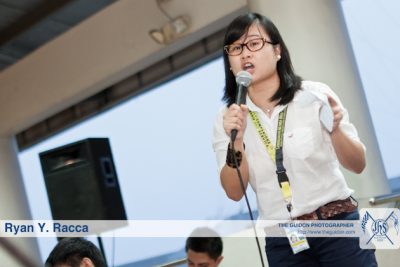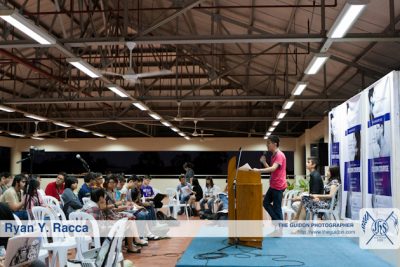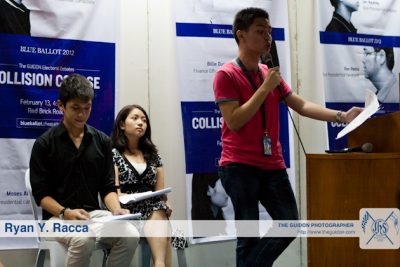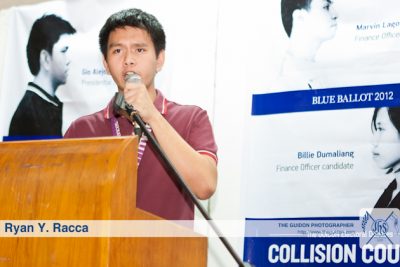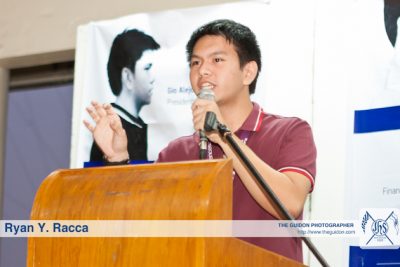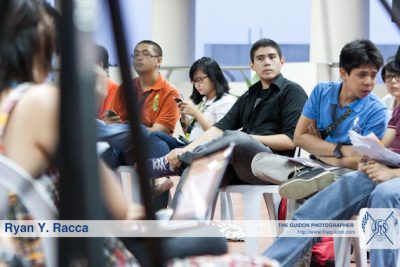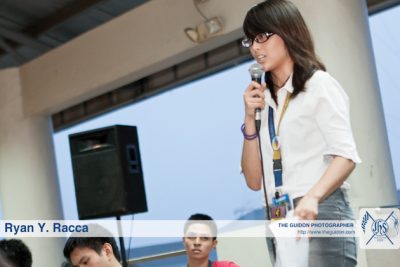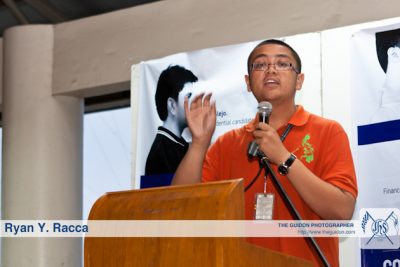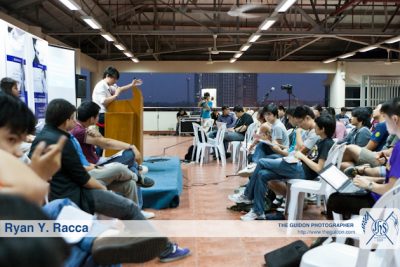What issues and points for disagreement were raised in Collision Course: The GUIDON Electoral Debates 2012?
In Collision Course, The GUIDON Electoral Debates 2012, held last February 13 at the Leong Hall Roofdeck, many contentious issues were raised for the consideration of student party members and then aspiring student politicians.
Collision Course provided an occasion for a heated debate regarding three issues: the university’s thrust for social entrepreneurship, the concerns regarding the Sanggunian’s huge budget, and the relevance of ideology to student politics.
Social entrepreneurship reassessed
Various candidates who ran in the Sanggunian General Elections do not see social entrepreneurship as the key means to nation-building. This issue was the first topic debated about in Collision Course.
The motion for the particular round read, “This house would further promote social entrepreneurship as the Ateneo’s primary strategy towards nation-building.”
Even with a general disagreement among the student leaders to the idea of tagging social entrepreneurship as the Ateneo’s primary strategy towards nation-building, however, the debate participants still held nuanced views on the matter.
Former School of Social Sciences Chairperson Ana Raymundo, president of the Movement for Ignatian Initiative and Transformative Empowerment (Ignite), stressed that social entrepreneurship favors students taking business-related courses.
She said that the concept of social entrepreneurship is not even “clarified” within the Ateneo and questioned whether it had already been contextualized or not.
Raymundo added that Ateneo is not made up of students whose competencies are just setting up enterprises. For her, social entrepreneurship as a strategy is still a work in progress.
Meanwhile, Cate Sison, a member of political coalition Alliance of Student Leaders (ASL) and now successfully elected secretary-general candidate, initially said in her speech that social entrepreneurship was a viable solution because it creates sustainable livelihood.
In response to Raymundo, Sison maintained that social entrepreneurship as an endeavor is not limited to business majors alone.
She said that other majors could help in setting up enterprises because their skills can respond to the needs of various beneficiaries, depending on the nature of the enterprise.
Sison maintained that the ultimate strategy is to be able to tap into the interests and knowledge of the students, and that social entrepreneurship should not necessarily be the only strategy employed.
Sanggunian President Gio Alejo, then still a candidate, held the same view as Sison, saying that social entrepreneurship is not the only viable avenue for the Ateneo to reach out. Students must see the bigger picture, he said.
He pointed out other examples of Atenean service, such as the service-learning education framework, the Pathways to Higher Education program and the university’s disaster response efforts.
Alejo emphasized the need to look at different avenues for Ateneans to create positive and substantial change. Having a dialogue with students and determining key initiatives are his propositions to achieve such change.
Now incumbent SOSS Chair Toni Potenciano, a member of the Christian Union for Socialist and Democratic Advancement (Crusada), dismissed social entrepreneurship as “inherently private and isolates the people involved.”
She explained that social entrepreneurship follows the modernization model that is anchored on capitalism. Potenciano explained that capitalism has been empirically proven not to work in third world countries in Asia.
Potenciano stressed the value of democratic solutions instead, calling for a deeper analysis of the issue not only in its economic aspects but also in its political aspects. She pointed to national hero Jose Rizal as a model, who she said aspired for a change of consciousness among the Filipinos during the Spanish colonial era.
The budget examined
To end a project-oriented Sanggunian, and therefore to dramatically cut its budget, was the promise made by then finance officer candidate Marvin Lagonera of Crusada, who lost in the elections. He made the assertion as student leaders argued for or against the second motion of the debates, “This house would dramatically reduce the Sanggunian’s two million-peso budget and redistribute the money to student orgs instead.”
Lagonera, drew criticism from opponent and now Finance Officer Billie Dumaliang of ASL, losing vice presidential candidate Dan Remo of Ignite, and winning vice presidential candidate Ian Agatep.
Lagonera suggested that the budget allocated to the Sanggunian be divided among the Council of Organizations of the Ateneo (COA), the League of Independent Organizations, the Ateneo Resident Students Association (ARSA) and the student political parties.
The Sanggunian, he said, also needs an intensive realignment. Lagonera wants the Sanggunian to be a coordinating body among organizations, a legislative body on relevant issues, and a representative body for the students.
He was unable to finish his speech due to the time limit.
Dumaliang disputed the claim of Lagonera, saying that the Sanggunian had not been project-based this school year. She cited the grand consultation as an example of a policy initiative.
She also said that the Sanggunian has no fixed budget, as opposed to the idea that it receives a fixed amount.
Dumaliang argued that student organizations can make do with money allotted to them. She said that she talked with the presidents of several student organizations recently, and noted that these leaders asked her, “If you give us the money, how sure are you that we will use it right?”
With this basis, Dumaliang therefore disagreed with simply redistributing the money.
Lagonera retorted by asking why the Sanggunian then still gives money to some organizations. He further added that the Sanggunian’s and the organizations’ projects sometimes overlap, and so the Sanggunian should just seek to strengthen organizations instead.
Remo, meanwhile, gave a nod at reducing the budget of the Sanggunian, but disagreed with Lagonera’s point that the Sanggunian is supposed to be a coordinating body.
Remo explained that the Sanggunian has no absolute rights over organizations under COA. However, he added that there are Sanggunian projects that need financing, such as thesis grants and subsidies.
Agatep said that the Sanggunian has projects that even go beyond its scope. He added that the Sanggunian is open to give money to organizations that need it.
Ideology a divisive issue
While Alejo was quick to dichotomize ideology into having one or not having one at all, student leaders Miguel Rivera and AJ Elicaño were just as quick to refute his point.
The issue of ideology was the third topic debated about in Collision Course. The motion for the particular round read, “This house believes that ideology is essential to campus politics.”
Alejo said that having an ideology grounds a person and gives him a particular perspective. However, he also said that not having an ideology should in no way hamper person from taking action, such as from participating in the Sanggunian.
Though Alejo said that the Sanggunian has its core principles, he also explained that the Sanggunian is open to students of different ideologies.
Rivera, former Crusada premier, argued that ideology is something everyone always has. He further asserted that Ignatian values are not meant to be ideological, but are there only to form students holistically. He made the comment as other debaters seemingly conflated the function of Ignatian values with that of ideologies.
The Crusada member said that the current status quo is “stupid,” criticizing the current Sanggunian for not speaking up sufficiently on major issues such as the campus security change or the SM Blue Residences controversy.
He therefore said that people should vote for ideological candidates who in turn will push for action.
Whereas Rivera came down hard on the current student government, Elicaño focused on the essence of ideology.
Elicaño, Ignite vice president for strategy and now the School of Humanities Senior Central Board representative, also agreed with Rivera on the fact that everyone inevitably has an ideology and a stand.
He analogized the importance of ideology to campus politics to the importance of breathing to life. Ideologies, he said, are frameworks for understanding context in different perspectives, bringing a thorough awareness of matters.
In defense, Alejo concluded that in the end, people may or may not have their own ideologies. He asserted that students who do not have a definite ideology are still welcome to join the Sanggunian.
Losing presidential candidate Moses Albiento also problematized Alejo’s assertion that the Sanggunian already has its own framework.
He said that it is hard to assert oneself in the Sanggunian because of such a framework, noting that issues just die down in the Sanggunian.
Albiento explained that the encounter of different ideologies paves the way for discourse, something he finds value in.
Losing vice presidential candidate Jed Llanes said that the question of whether ideology is essential to student politics “right now [is] nonsense.” He said that students do not vote because of ideology.
He, however, ultimately said that ideology is important and that the appreciation of it should be the goal, given most students’ disregard of ideology.
Editor’s Note: This recap was adapted from The GUIDON’s online releases on http://blueballot.theguidon.com/. Video recaps are also available in that site.
- Photo by Ryan Y. Racca
- Photo by Ryan Y. Racca
- Photo by Ryan Y. Racca
- Photo by Ryan Y. Racca
- Photo by Ryan Y. Racca
- Photo by Ryan Y. Racca
- Photo by Ryan Y. Racca
- Photo by Ryan Y. Racca
- Photo by Ryan Y. Racca


